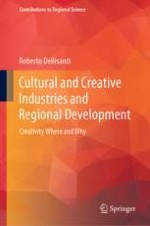2023 | OriginalPaper | Buchkapitel
9. Creativity Where and Why. Results, Policy Implications, and Future Challenges
verfasst von : Roberto Dellisanti
Erschienen in: Cultural and Creative Industries and Regional Development
Aktivieren Sie unsere intelligente Suche, um passende Fachinhalte oder Patente zu finden.
Wählen Sie Textabschnitte aus um mit Künstlicher Intelligenz passenden Patente zu finden. powered by
Markieren Sie Textabschnitte, um KI-gestützt weitere passende Inhalte zu finden. powered by
